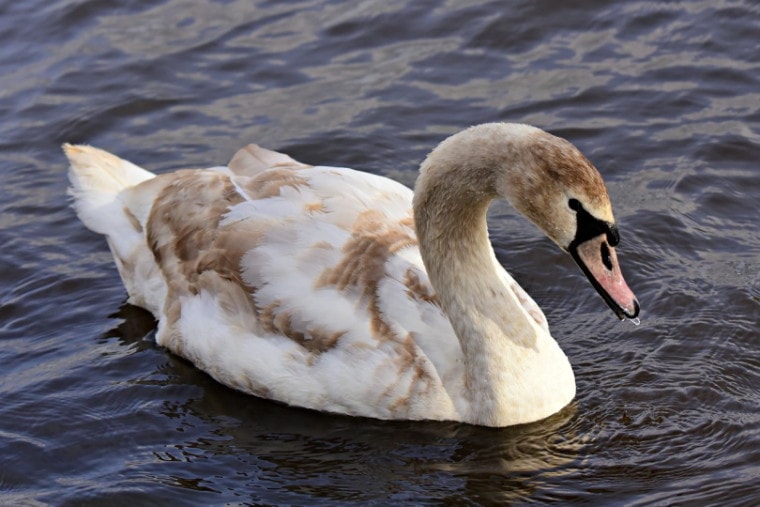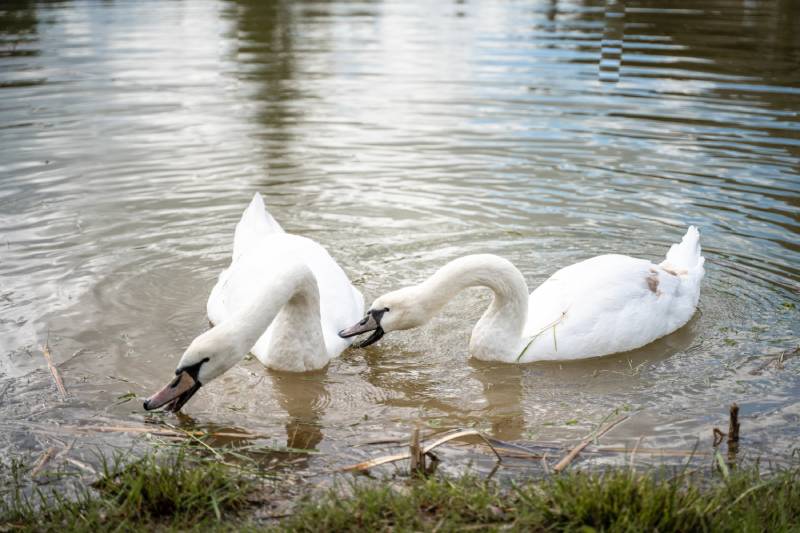
Swans are quite majestic birds, and it’s quite normal for people to be curious about them. But can you keep a swan as a pet? Is it possible to add it to your backyard with other domesticated animals?
These are tricky questions because there are no easy answers. The short answer to keeping a swan as a pet is yes, maybe. In some places, it’s legal to raise them but not breed them. In others, they’re illegal to keep. In still other places, there is nothing to stop you from raising a swan—provided you have the space and means to care for it properly.
As for keeping a swan in your backyard with other domestic animals, keep reading to learn why that’s not such a great idea.
Ethical Dilemma of Keeping a Swan as a Pet
While you could, theoretically, own a swan in some jurisdictions, a more pressing question is, should you? The answer to that is no. Here at Pet Keen, we do not endorse keeping wild animals as pets. Swans are wild animals and survive well out in nature. While some people do keep them as pets, this is quite against the laws of nature. Even rescues should be released back into the wild after they grow or get better.
Stick around, and let’s get to learn more about swans. This will paint a better picture of why they don’t make ideal pets.

Why Are Swans Not Kept as Pets?
It’s quite common for people to want to pet and cuddle all animals in the world. If you look online, you’ll come across videos and images of people wanting to pet even the wildest of animals. But, this isn’t always right since the creatures do better in the wild.
Swans are a bird species that are quite big and majestic. Thanks to their graceful nature, elegance, and white appearance, many people desire to have them as pets. But, as mentioned above, they can’t be kept as pets.
Some people argue that they can get swan eggs and hatch them. That way, the babies that hatch will be domesticated from the beginning. While this can work out, (and some people do this), there are reasons not to keep swans as pets, such as:
Swans Don’t Like Smaller Habitats
Out in the wild, swans love space and lots of water. These aquatic birds live in marshy or swampy areas. The habitats provide the perfect homes and ample area to raise their young.
While it’s possible to replicate the swans’ natural habitat at home, not everyone can. Most of us have smaller backyards that can’t accommodate the majestic birds. They will feel cramped up and can even have poor development as a result.
That’s why it’s better to let them be in nature. Or raise the young ones and release them when ready to go. These birds need to roam free in large spaces, so consider the cost of setting up such a habitat before getting swans.

Adult Swans Are Huge
Unlike chickens, ducks and geese, adult swans are on a whole other level. These birds do start as tiny chicks when they hatch from eggs. But in a short period, you end up with a bird that’s about 1.5 m in height.
Adult swans are tall and can weigh 30 pounds or more. Apart from the fact that these birds are tall and huge, they eat a lot. So, be ready to factor in extra feed costs to keep them satisfied. And if you have kids, it can be quite daunting watching them interact with these huge birds in your backyard.
Swan Predators
Having swans as pets exposes your home to roaming predators. Swans have many other animals that can attack them for food. These include foxes, wolves, eagles, snakes, and raccoons. Once you have swans around, it’s quite common to start seeing these hunters roaming around.
Therefore, since swans require lots of lands to roam, you must budget for additional protection. You have to incur the cost of fencing in a large area that includes a water body. It’s the best way to keep the swans safe, but in a habitat they can thrive in.

Swans Aren’t Rescues
Many people come across baby wild animals and assume they’re lost. No, the mother might be just around the corner. Therefore, that cygnet you want to save and take home doesn’t need saving. Mothers will leave their young to fight off predators or look for food.
If the cygnet is really lost and the mother is nowhere to be found, it’s better to take them to an animal shelter. It’s tempting to take them home as pets but, rescue shelters for wild animals know how to give them better care. Once they grow up, they can be returned to the wild where they belong.
- See also: Embden Goose
How Much Space Do Swans Need?
Even after learning swans are better off in the wild, some still want to keep them as pets. In such cases, you have to consider the best way to have them around your home. As mentioned above, swans need ample space to thrive, plus a body of water.
It means you must be ready to replicate their natural habitat at home. But before you do so, learn the law. Some states do not permit people to keep swans at home as pets. Visit the local authority before placing an order on swan eggs to hatch at home.
If you get the green light, you have to acquire a large piece of land and fence it off for protection. Ensure the land has a pond or an equivalent body of water. Swans are waterfowl and love being in water most of the time.
The waterfowl you introduce to a new place takes time to acclimate. Therefore, you might need added protection to keep them from escaping. Be careful if you attract wild swan to your area. While they might stay, it’s best to enjoy them from a distance since they can be quite aggressive.

- See also: Czech Goose
How to Attract Wild Swans to Your Pond or Lake?
It’s quite possible to have pets in the vicinity of your home without keeping them as pets. All you have to do is attract them to the land and pond or body of water that you have. These birds won’t want to leave any time soon with the perfect conditions. To attract them, do the following:
1. Build Swan Islands
A swan island is a raised area in the body of water where a pair of swan stays. The island must be several feet off the water for swans to want to be there at all. It’s a safe space where they lay their eggs and raise cygnets away from predators.
An ideal swan island must have a circumference that’s more than 50 feet. Remember, adult swans are big, and they like staying in pairs. Also, the island must be made from natural plants, grass, and twigs.

2. Get Swans’ Favorite Plants
Every animal loves being around food sources that they like, even swans. These majestic birds thrive in aquatic areas with different plants like eelgrass, duckweed, and pondweed. But check with your local authority if it’s okay to plant them before you do so.
These plants are excellent food sources in the warmer months. But when the weather changes, their supply dwindles. That’s when swans shift to eating cranberries, wheatgrass, lupine, water plantain, and tubers like carrots.
Making sure the pond has these plants is another way to attract and keep swans around. While these are still wild birds, it’s quite lovely having them there.
- See also: Sebastopol Goose
3. Ensure the Water Is Safe
Water quality is essential to swans as they are very sensitive to pollution. It’s up to you to improve the water quality and maintain it if you want swans around. All passing swans will get curious about your pond and want to stay there for some time if it’s ideal.

4. Minimize Hunting
Swans love places where they feel safe to live and raise cygnets. If you have a vast land area and want them around, minimize human activities such as hunting. While there are places you can hunt swans and other waterfowl, this can prevent them from ever returning after migrating.
Therefore, keeping the space safe and free of hunters is another method of attracting wild swans. Also, ensure they have protection from predators. While it’s impossible to control all nature, you can find ways to keep predators at bay.
Are Swans Aggressive? Can They Attack Humans?
Like most birds would attack if you try to come too close to their nests or young ones, swans aren’t any different. Only that these are bigger birds and can do a lot more harm. Nesting swans lying on some eggs detest having humans come near them.
Swans form monogamous pair bonds meaning where there’s a female, a male isn’t too far away. These birds will bite, scratch, and do all manner of damage to keep you away from their eggs or cygnets. So, it’s best to keep a safe distance.
Mating and breeding season aren’t ideal for approaching wild swans. Even those that you keep as pets are best left alone. If you have to check on them, take extra precautions to avoid getting injured.

Conclusion
A swan is a wild aquatic bird that’s not ideal for keeping at home as a pet. Adults grow quite tall and heavy, meaning they need lots of space and food to sustain themselves. Suppose you want to have them around as pets; be ready to invest in a vast space and pond for them. Also, make sure to check with local authorities if you’re permitted to have swans as pets in the first place.
We do not advocate keeping swans as pets. There are other methods listed above you can use to attract wild swans to your property. However, they must always be at liberty to leave. Swans are aggressive when mating, nesting, and raising cygnets, so approach them with care.
Featured Image Credit: MabelAmber, Pixabay









